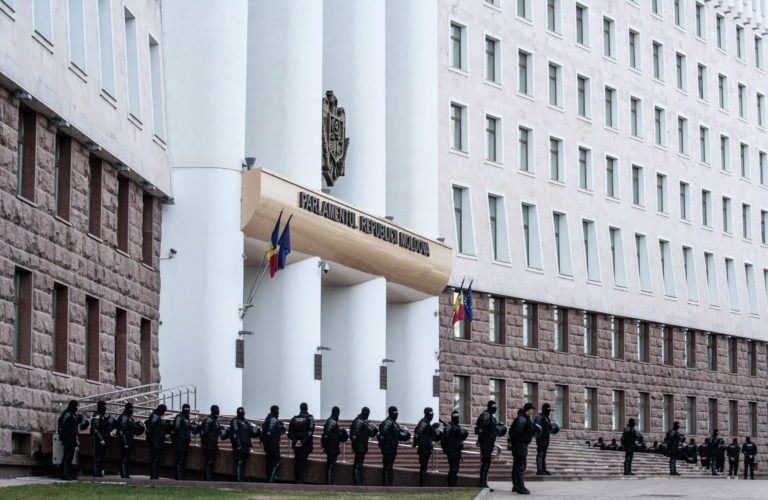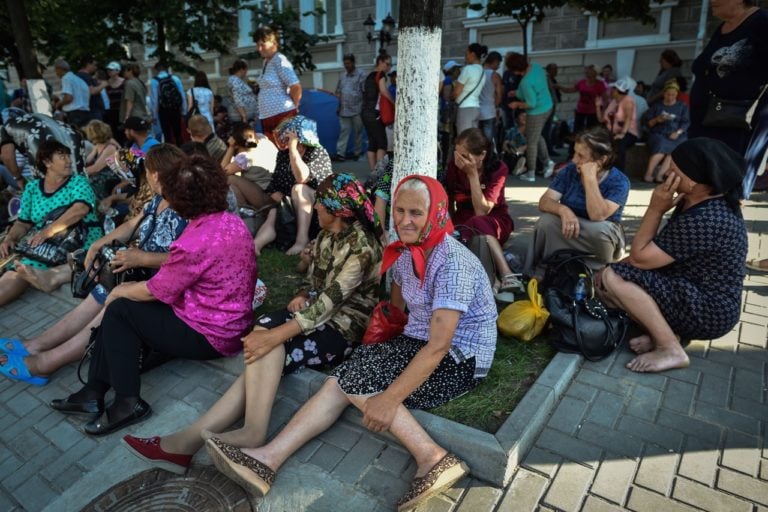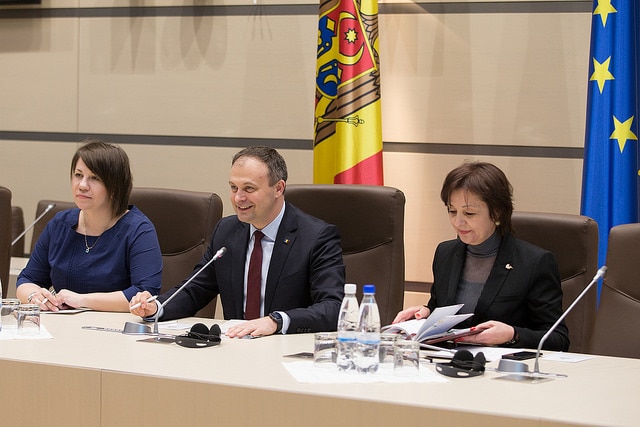(RSF/IFEX) – RSF has expressed concern over the deteriorating press freedom situation in Moldova as about 30 journalists continue to occupy the boardroom of Teleradio Moldova, the state broadcasting company. The journalists have been occupying the premises since 27 July 2004. About 100 police and military officers surround the building. The protest comes in response […]
(RSF/IFEX) – RSF has expressed concern over the deteriorating press freedom situation in Moldova as about 30 journalists continue to occupy the boardroom of Teleradio Moldova, the state broadcasting company. The journalists have been occupying the premises since 27 July 2004. About 100 police and military officers surround the building.
The protest comes in response to recent changes to the employee recruitment process following a review of the company’s legal status. The journalists claim the recruitment process is driven by political rather than professional considerations.
In a separate case, on 22 July, the Chisinau Appeals Court upheld an earlier ruling ordering the opposition weekly “Timpul” to pay damages in a defamation suit that could bankrupt the newspaper.
And on 20 July, the administrative division of a Chisinau Appeals Court upheld a decision to refuse accreditation to Dmitri Ciubascenco, editor-in-chief of the twice-weekly “Moldavskie Vedomosti”.
Continuing demonstration at Moldova state television and radio
The conflict between staff and management at the state broadcaster began in November 2003, following a legal amendment breaking up the existing company and creating a new public service, with a one-third cut in staffing levels. The journalists at the time voiced their fears about the broadcaster’s independence.
The law called for the establishment of a 15-member monitoring committee, but in the end, the committee’s membership only served to consolidate the power of the ruling party. Ilie Telescu, the director of TeleRadio Moldova, as well as a large majority of the monitoring committee are pro-communist.
In a 27 July press conference, the journalists called for the resignation of the station’s managers and the reversal of all recent decisions taken by management, in particular the recruitment of staff following the company’s change in status.
They then demonstrated in front of the building before occupying the boardroom where the staff recruitment committee was sitting. They complained that recruitment was driven by political rather than professional criteria, noting that no members of an “anti-censorship committee” set up by journalists at the state broadcaster in May 2003 to combat management pressure had been selected.
The journalists’ sit-in began as 70 salaried staff announced the creation of a “committee for the defence of professional and human values”. Nineteen journalists were suspended after the announcement.
The management then blocked the journalists from entering the premises. About 100 armed police and military surrounded the building and seized tents from journalists who had arrived to show their support to their colleagues.
Expressing concern over the deteriorating state of press freedom in the country, RSF said, “The change in status of Moldova state radio and television passed last December should not in any way be used as a pretext to recruit journalists according to their political compliance.”
Sentence against the weekly “Timpul”
On 22 July 2004, the Chisinau Appeals Court confirmed the sentence against the opposition weekly “Timpul”, ordering the paper to pay damages of about 130,000 euros (approx. US$156,400) for defamation to the firm Daac-Hermes.
On 28 April, the Buiucani District Court in Chisinau had sentenced the newspaper for defamation in connection with a 16 January article carried by the paper, entitled, “Luxury in a Land of Poverty”. The article revealed the existence of a deal between the state chancellery and Daac-Hermes for the sale of luxury cars.
On 23 June, Alina Anghel, author of the article, was brutally attacked by unknown assailants. The journalist was due to appear in court in connection with the case the following day. She has received numerous phone threats since the article appeared.
Editor-in-chief of “Moldavskie Vedomosti” still denied accreditation
On 20 July, Chisinau Appeals Court’s administrative division rejected a complaint brought by Dmitri Ciubascenco, editor-in-chief of the twice-weekly “Moldavskie Vedomosti”, against the presidential administration. The journalist, one of the most prominent in the country, has been deprived of accreditation since the beginning of the year. On 8 June, the paper’s bank accounts were frozen following a defamation case brought by a businessman.


